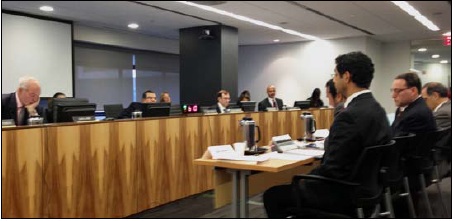US Commission on Civil Rights Holds Briefing on Federal Civil Rights Engagement with the Arab and Muslim American Communities Post 9/11

On November 9, the United States Commission on Civil Rights held a timely briefing on Federal Civil Rights Engagement with the Arab and Muslim American Communities Post 9/11 , says an MPAC Press Release.
The briefing was prompted by anti-terrorism programs post 9/11 which have proven to be problematic and ineffective with real concerns on their intrusion of civil rights and civil liberties. Panelists providing testimony were asked to evaluate the “successes and failure of the federal government in engaging the Arab and Muslim American community post 9/11” and to address the discrimination faced by those communities by national security programs.
Muslim Public Affairs Council Director of the Washington DC office Haris Tarin testified at the Commission and stressed the importance of engaging American Muslim communities with law enforcement agencies to build trust and work together on a diverse range of issues. He discussed the trickle-down effect of public and elected officials who marginalize American Muslims to the subsequent bullying of American Muslim students.
Tarin commented on the two approaches taken by government and law enforcement agencies: 1. Treating them as suspect communities or 2. Treating communities as partners. Whereas the NYPD generally uses the first model of engagement, other local law enforcement agencies such as in Los Angeles, Dallas and Chicago, the use of partnering with communities is more prevalent and in turn, shows to be more effective.
Tarin also spoke about the civil rights challenges that American Muslims have been facing since 9/11. From intrusive surveillance practices by law enforcement agencies to intimidation of Muslim students about their political views on college campuses, Tarin addressed the importance of oversight from Congress and the administration on many of these issues:
The key word here is partnership; it is this partnership that yields results both in making us a safer society and in ensuring that the civil liberties of our communities are preserved so that the foundation of our democracy remains strong.
Testimony from other experts on the panel agreed and went further to say that civil rights and civil liberties issues must be expanded from just Muslim issues to include all faiths and ethnic backgrounds. To that end, the Department of Justice is currently working on including anti-Sikh and anti-Arab statistics in their hate crime reports.
This endeavor could not have been made possible without the partnership of DoJ and minority communities. The briefing concluded with the Commissioners asking a series of questions to the panelists in order to further understand the problems and possible solutions and opportunities for improvement and redress. As we continue to deal with post 9/11 programs, the very real concerns of the cross section between civil liberties and national security must be addressed.
With the re-election of President Barack Obama comes the expectation that these issues and more will be discussed and eventually addressed as our nation continues to move forward. The fact that the US Commission on Civil Rights, an entity created to “inform the development of national civil rights policy and enhance enforcement of federal civil rights laws,” commenced this public briefing is a big step forward in recognizing that serious reforms need to be made when it comes to safeguarding our nation and upholding our civil liberties.
Back to Pakistanlink Homepage
-------------------------------------------------------------------------------------

